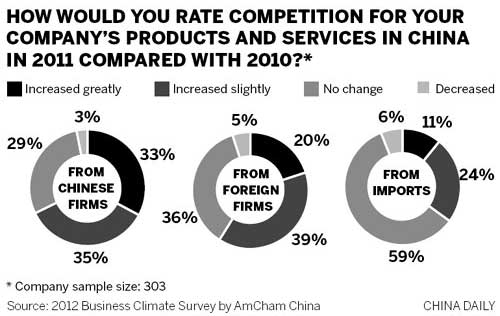Multinationals feeling pressure of Chinese companies
Updated: 2012-05-26 10:09
By Andrew Moody (China Daily)
|
||||||||

China has not been a market where Chinese and foreign companies can compete on completely level terms. Certain sectors of the economy - including natural resources industries, financial services and telecommunications - have restrictions on foreign competition. These sectors are typically dominated by large State-owned enterprises.
A new factor, however, is the changing nature of China's private sector which is rapidly upscaling from largely low-tech, export-oriented manufacturing to more high-tech sectors, which was once solely the preserve of foreign companies.
The Chinese private sector is being driven into making this change largely by rapidly rising labor costs, which is reflected in both the recent surveys.
More than four-fifths (82 percent) of those interviewed in the AmCham survey said rising labor costs were affecting their business operations. Finding and retaining human resources was the biggest challenge facing those in the CEIBS survey, cited by 130 - more than half - of the respondents.
Hans Hendrischke, professor of Chinese political economy and director of the Confucius Institute at the University of Sydney, said that because of this, Chinese firms are increasingly entering markets dominated by multinationals.
"Rising labor costs put pressure on Chinese enterprises and they are spreading their wings and extending into other areas and you are finding this tightening of competition," he says.
Juan Ignacio Motiloa, vice-president of the EU Chamber of Commerce in China, which has 1,700 members and will highlight competition in its own Business Confidence Survey later this month, said Chinese companies are certainly moving up the value chain.
"That is probably the cause of the increasing competition we are seeing today," he said.
He said it has never been more important for European and other foreign companies to maintain their lead.
"This is the only way for us to sell, survive and compete by preserving the technology gap between domestic and European companies. We have to ensure it is wide enough so our clients recognize the premium."
Despite the increasingly tough market conditions, Motiloa said China is a better place to be than the West at present.
"If you look at the world and what is happening in Europe and the US, we are looking to China as one of the sources of growth these days," he says.
"This is the Champions' League. If you really want to succeed worldwide you really have to succeed in China, even though it is a tough market and very competitive in some sectors," he added.
Those who have worked closely with Chinese private companies believe they now have the capability to outwit large foreign companies since they have flatter management structures and are able to make quicker decisions.
Paul Cheng, the Hong Kong politician and businessman who examines the competitiveness issue in his new book On Equal Terms, said Chinese firms are proving themselves very responsive.
"I always tell my multinational friends while you are spending days in a conference room talking about mission statements, your local competitors are already out there selling," he said.
"Chinese entrepreneurs are very entrepreneurial in the sense they are willing to gamble. They are risk takers and they are willing to go from rags to riches and back to rags, if necessary."
Tse at Booz & Co agrees that the new generation of Chinese entrepreneurs can prove more than a match for some foreign companies.
"They are mostly still much first generation businesses with the founders still running them. They tend to be very good at synthesizing information and making decisions whereas the multinationals have a set of processes, systems, checks and balances which might be appropriate in a modern enterprise but is not an advantage in China where things can move very quickly," he said.

 Relief reaches isolated village
Relief reaches isolated village
 Rainfall poses new threats to quake-hit region
Rainfall poses new threats to quake-hit region
 Funerals begin for Boston bombing victims
Funerals begin for Boston bombing victims
 Quake takeaway from China's Air Force
Quake takeaway from China's Air Force
 Obama celebrates young inventors at science fair
Obama celebrates young inventors at science fair
 Earth Day marked around the world
Earth Day marked around the world
 Volunteer team helping students find sense of normalcy
Volunteer team helping students find sense of normalcy
 Ethnic groups quick to join rescue efforts
Ethnic groups quick to join rescue efforts
Most Viewed
Editor's Picks

|

|

|

|

|

|
Today's Top News
Health new priority for quake zone
Xi meets US top military officer
Japan's boats driven out of Diaoyu
China mulls online shopping legislation
Bird flu death toll rises to 22
Putin appoints new ambassador to China
Japanese ships blocked from Diaoyu Islands
Inspired by Guan, more Chinese pick up golf
US Weekly

|

|






